When you’re out in the field and trying to find those valuable pieces of metal, the last thing you want is for outside noise to interfere with your ability to hear the detector.
That’s why it’s important to have a good pair of headphones. Specifically designed for your needs. In this article, I’ll help you learn what features you should look for when purchasing headphones for metal detecting.
You’ll also get my expert review of the best headphones you should choose from.
So whether you’re looking for wireless headphones or something easy to stow away, I’ve got you covered!
Top Metal Detecting Headphones at A Glance
| Image | Product Title | Features | Price |
|---|---|---|---|
Best Overall  |
| Check at Amazon | |
Best Wireless  |
| Check at AmazonCheck at Kellyco | |
Best for Beginners  |
| Check at Amazon | |
Best Underwater  |
| Check at AmazonCheck at Kellyco | |
Cheapest Wired  |
| Check at Amazon | |
Best for Hearing Impaired  |
| Check at AmazonCheck at Kellyco | |
Alternate 1  |
| Check at Amazon | |
Alternate 2  |
| Check at AmazonCheck at Kellyco |
Metal Detecting Headphones Reviews

Before you learn the ins and outs of buying a pair of quality headphones, I want to show you why each of these picks is worthy to be your go-to headphones for metal detecting.
So, hear me out Diggers (pun intended).
Detectorpro Gray Ghost Ultimate Headphones: Best Overall
The Gray Ghost!
The best metal detecting headphones for your money.
These wired headphones were made to give you and your metal detector the best chance of success.
You’ll love these premium metal detecting headphones. Not just for the updated individual volume control. Or for the adjustable headband and comfort fit design.
But when you hear your metal detectors loud chirps and beeps coming through, you won’t lose any ounce of crisp clarity.
External noises become a thing of the past!
While you don’t have to worry about things like battery life, I’d be happy for that trade-off if the Gray Ghost Ultimate came with a wireless transmitter.
- Premium sound for small targets
- Designed to block outside noise completely
- Tuned cavity design for more sensitivity to targets
- Industrial grade strain relief for cord termination
- Not Bluetooth capable
- Not waterproof
The Verdict: If you’re in need of headphones for metal detecting, you won’t find much better than these. DetectorPro spared no expense to give you a quality product that delivers the ultimate sound experience.
Do yourself a favor and buy the Gray Ghost headphones. You won’t regret it.
Garrett MS-3 Z-Lynk Wireless Headphones KIT: Best Wireless
While the Gray Ghost is my go-to and favorite headphones, there’s something to say about a wireless option.
In comes the best Garrett metal detector headphones.
Garrett metal detectors make an amazing product. If you already own a metal detector, you know the type of quality and performance you get with them.
Their headphones for metal detectors are no different.
The MS-3 Z-Lynk kit comes with the (adjustable headband) wireless headphones, and the Z-Lynk transmitter.

Z-Lynk technology is 6 times faster than Bluetooth due to its low latency design.
When it comes to wireless metal detecting headphones, these are the best headphones you’ll find when you’re concerned with weak signals and excess noise.
The only thing missing is if Garrett had made these underwater headphones. Then there’d be no limits with the MS-3.
- Wireless for tangle free detection
- Z-Lynk technology makes it 6 times faster than Bluetooth
- Kit includes transmitter at a bundle price
- Need to charge battery consistently
- Not waterproof
The Verdict: I love this pair of headphones a lot. As a wireless option, there isn’t a better choice. I still think the Gray Ghost has the better sound.
But if you’re dead set on going wireless, the Garrett MS-3 won’t let you down.
Garrett ClearSound Easy Stow Headphones: Best for Beginners
If you’re a beginner Digger, there are alternative detecting headphones for your Garrett metal detector.
Actually, any brand of metal detector with a 1/4″ jack will work just fine with the Garrett ClearSound Easy Stow headphones.
With in-line volume control, an angled plug for convenience, and an extra long coiled cable, you have all you’ll need to get started.
It’s a good pair of metal detecting headphones at a fair price.
But you aren’t getting any extras with it.
No mono stereo switch. The sound is not as crisp as the Gray Ghost Ultimate or Garrett MS-3.
The ear muffs could definitely be more comfortable. And forget about it being as advanced as any Garrett submersible headphones.
- Fair price for reliable headphones
- Easy to plug and go for beginners
- Able to fold up for easy storage
- Control of volume is limited
- Not wireless or waterproof
- Not capable to switch from mono to stereo
The Verdict: The Easy Stow headphones are good for those still learning. No need to spend a ton if you aren’t sure you even like metal detecting.
But if you’re all into dirt fishing, take my advice. Upgrade to a better model with more bang for your buck.
Gray Ghost Amphibian Underwater Headphones: Best Underwater
Another Gray Ghost has made the list. But the Amphibian is for those of you taking your treasure hunting underwater.
The Amphibian is just as power-packed and high-quality as others of its kind.
But with this Gray Ghost model, you get an extra strong cable wire that connects safely to your metal detector with an IP68 graded plug.
Detect for hours without worrying about water leaking through the soft and snug earpieces.
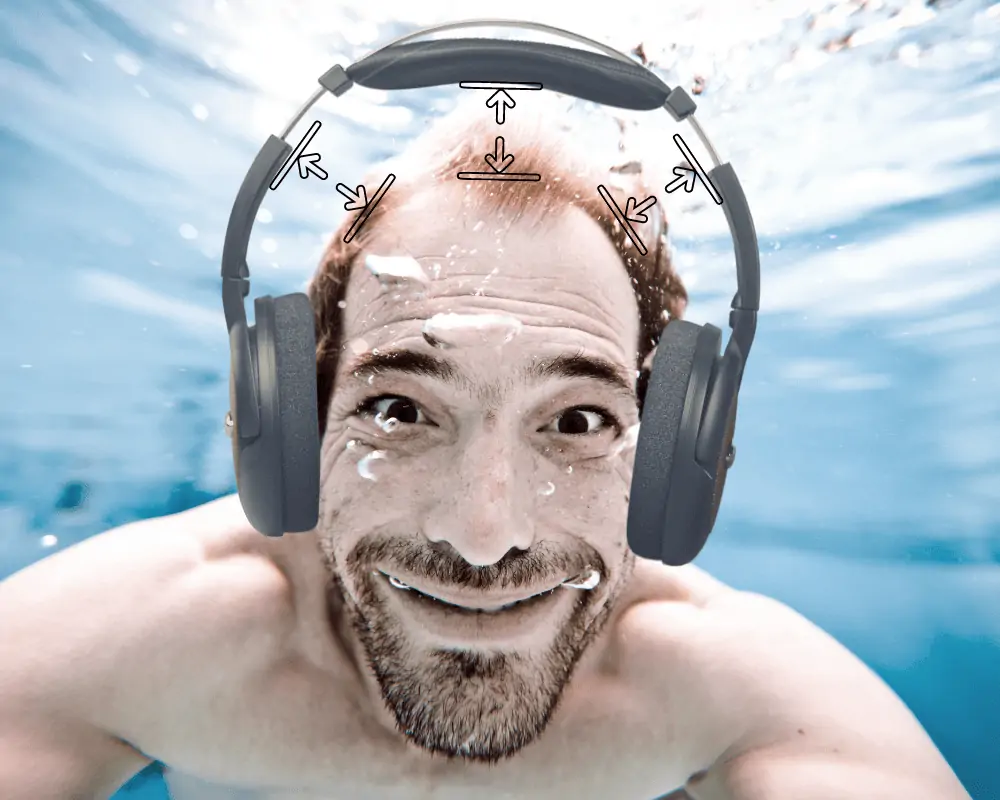
Don’t worry about a weak signal with increased depth either. These waterproof headphones keep a strong audio transmission while metal detecting down below.
They even work with Garrett’s advanced pulse induction (API) Infinium metal detectors (replaced by the newer ATX).
Now for the downside…
The Amphibian metal detector headphones aren’t great when it comes to volume control. Many detectorists have complained of a consistent sound, but a sound level that’s hard to hear.
While I think these are the best headphones for metal detecting underwater, there are some upgrades I’d like to see.
- Underwater capable up to 30 feet
- Foldable for compact storage
- Need to buy specific Amphibian model for different detectors
- Not wireless capable
The Verdict: For underwater hunting, there isn’t much better out there. But be warned. Besides what I’ve already mentioned, there are several versions of the Amphibian. Your price may change depending on your metal detector.
Koss UR20 Headphones: Cheapest Wired
The Koss UR20 stereo headphones are not specifically made for metal detecting.
However, the 1/4″ and 1/8″ stereo plug makes them an inexpensive accessory for most metal detectors.
Besides the price, you also benefit from the 8-foot-long cable and extremely comfortable leather padding.
Other than that, don’t get your hopes too high.
Koss makes a decent product. But these are more for DJ equipment or gaming.
Your choice of metal detecting headphones should include more functionality. Like advanced volume control or a mono stereo switch option.
- Best price on the list
- Extra long cable
- Not specific for detectors
- These are not the best quality
- You won't find any advanced controls on this set
The Verdict: If budget is your biggest concern, the Koss UR20 wired headphones will do in a pinch. Although that isn’t much of an endorsement from me. If you can stretch the budget even a little, the Garrett Easy Stow is a much better option for you.
Detectorpro Black Widow Headphones: Best for Hearing Impaired
Do you usually spend your time metal detecting near busy areas? Or are you hearing impaired but still want the most out of your Minelab or XP metal detectors?
The perfect headphones for metal detecting for you are the Detectorpro Black Widow Headphones.
With larger padded earpieces, two independent knobs for volume control, and a dual audio switching system, you’ve found your match.
The only issue I have with it is you need a mono to stereo adapter depending on your metal detector.
- Ideal for those hard of hearing
- Great audio output for smaller and deeper targets
- Best option for gold
- May need adapter for audio depending on model detector
- Not wireless
- Not waterproof
The Verdict: If you are hard of hearing, the Black Widow headphones are a solid purchase. I still think the premium output of sound on the Gray Ghost Ultimate is just about on the same level. Granted, it doesn’t have separate volume controls for each ear like the Black Widow.
Bounty Hunter HEAD-PL Headphones: Alternate 1
Maybe you aren’t in love with any of the options? While I’d be shocked, I might be able to get you another option worth your time.
With a comfortable and simple design, the Bounty Hunter HEAD-PL wired headphones are affordable and reliable.
It has adjustable volume controls and outputs a clear studio-like sound. Like the Black Widow, this headset is equipped with volume control for each ear.
These are a decent pair of non wireless headphones under $50. If you can’t increase your budget, feel secure that Bounty Hunter is a good brand to go with.
Nokta 2.4 GHz Wireless Headphones: Alternate 2
The last alternative you should consider for your metal detecting journey is the Nokta 2.4 GHz wireless headphones.
Nokta Makro is a top brand in the metal detector world and they did not disappoint when making these Bluetooth headphones.
They’re lightweight, have a long battery life (20 hours!), and will even connect with your pinpointer. As long as it is Bluetooth.
Unfortunately, this Nokta option is not waterproof headphones. The audio signal is mono so you won’t be able to hear stereo sound.
And it doesn’t come with any charging headphone adapters.
But it’s better than ear buds, right?
Choosing Metal Detecting Headphones: The Five Pillars

You and I have looked at some really great headphones for your metal detecting adventures.
If I were you, I’d pick up the Gray Ghost Ultimate and call it a day.
You’ll be happy with the sound and performance you get with Detectorpro.
But maybe you’re stuck between the Ultimate and another pair.
I get it. It’s not always an easy choice.
So let me help you with that.

The best way to decide and choose the right metal detecting headphones for you is to consider each of the 5 pillars for headphone success.
- Budget
- Wired vs Wireless
- Comfortability
- Waterproof
- Sound Control and Quality
Understanding each, what it offers, or how important it is to you will narrow down your options.
Keep reading and grade each pillar yourself. Then trust in your decision.
Budget

How much money are you willing to spend on a good set of headphones?
$20, $50, $100, or even more?
You don’t need to break the bank but you also don’t want to go too cheap if you can help it.
Now I understand you don’t always have a choice. Sometimes your budget is the ultimate factor.
If that’s the case, don’t bother looking at more expensive models. You’re just going to tease yourself and feel underwhelmed with any headphones you choose.
If you aren’t in a stronghold by your wallet, ask yourself a few questions.
Do you have a firm ceiling you can’t go above?

Why do you need the headphones? Is it for privacy or just a general ‘want’? Or, is it necessary because of hearing issues or a problem caused by your metal detector speaker?
Will paying more for metal detector headphones improve your overall experience?
If you truly consider each of these questions honestly, you should have an answer as to how impactful the budget pillar is to you.
Wired vs Wireless
The next thing to think about is if you want wired or wireless headphones.

Wired headphones are the traditional type that has a cord connecting the two earpieces to your device. They’re powered by an audio jack from your metal detector.
Wireless uses Bluetooth to connect to your device and doesn’t have any cords getting in the way. The Bluetooth functions through either some circuitry in the headphones or through a separate transmitter connected by a short cable.
The obvious advantage of wireless headphones is the lack of cords. No more getting tangled up!
But, they come with a few disadvantages.

First, you have to worry about charging them. They don’t last as long as wired alternatives and need to be recharged regularly. If you’re in the middle of a great metal detecting session, you don’t want your headphones to die on you.
Second, they’re more expensive than wire-connected headphones (sometimes). If you’re on a budget, this might not be the best option for you.
And third, wireless headphones can have latency issues. This means there’s a slight delay between when the audio is created and when you hear the tones in your ears.

However, with the right pair of wireless headphones, this doesn’t have to be a problem.
If you remember, the Garrett MS-3 Z-Lynk wireless headphones have low latency that is 6 times faster than regular Bluetooth.
Ultimately, you will decide how important going wireless is to you.
Yes, there are drawbacks. But if you’re aware of them and prepare for them, your treasure hunting experience shouldn’t be affected.
Comfortability
Your next concern should be the comfort pillar. Especially if you plan on wearing your headphones for long periods of time.

How do they feel? Do they hurt after an hour or two of use? Are they too loose and fall off easily? Too tight and give you a headache?
When you get a chance to try the headphones on before first using them, don’t worry about the quality of sound yet.
Keep your headphones on for a couple of minutes. See how well you can adjust the headband and how secure they are when moving around.
Most importantly, pay attention to the ear muffs and their softness.
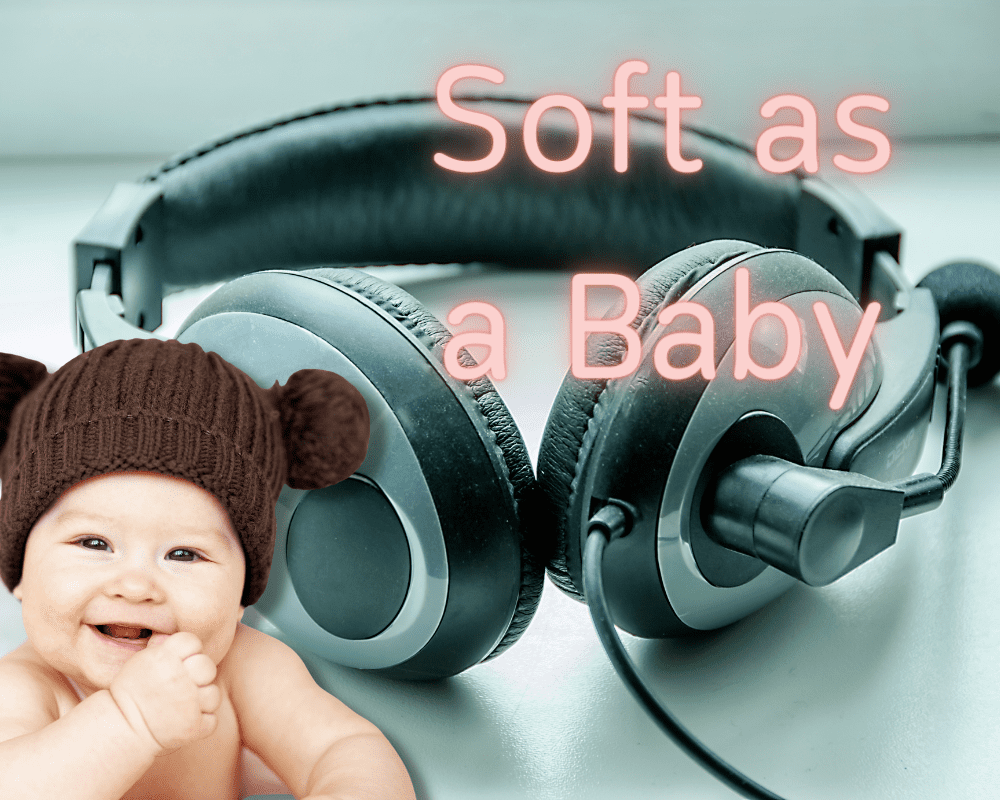
Are they leather or polymer? Do they give you a proper seal with plenty of cushion? Or, does any padding scrunch to nothing when placing them on your head?
You’ll be wearing these for long stretches, so make sure they’re comfortable!
Your ideal headphones should also be lightweight. If they weigh down on your head, it’ll give you a neckache before long.
You want the weight to be evenly distributed so it feels like you’re not even wearing them.
And finally, check to see if the ear muffs swivel. This will help you get a snug fit no matter the size and shape of your head.
Waterproof

Waterproof headphones are designed to keep the water out so it doesn’t ruin the inner workings. They have a tight seal that prevents any moisture from getting inside.
Maybe you don’t plan on metal detecting underwater. Don’t be so quick to skip this pillar!
First and foremost, you don’t know what the future holds. Underwater treasure hunting is a thrill and something that should certainly be on your bucket list.
But with that aside, consider the area you live in.
What sort of weather do you experience? Is rain a constant or do see a lot of tropical storms around you?

Sure you aren’t underwater, but it sure may feel like it.
If this is the case, you might not need fully waterproof headphones. But you’ll want to grab some that are weatherproof.
The difference between waterproof headphones and weatherproof headphones is that the former can be submerged in water for long periods of time without any damage.
The latter, however, are only resistant to a certain amount of water exposure. So if you’re caught in a rainstorm with your weatherproof headphones, they’ll be just fine. But don’t drop them in a puddle and expect them to work an hour later.

This is the one pillar you may be able to decide quickly whether it’s a buying factor. If you aren’t a big fan of rain and tend to steer clear of bad weather, check this box off your list.
Sound Control and Quality
Pillar number 5. The most important factor. At least it should be to you.
The whole point of you buying metal detector headphones is to get a clear sound. Regardless of any secondary reasons you have.
If the headphones don’t provide good sound quality, they’re not worth your time or money.
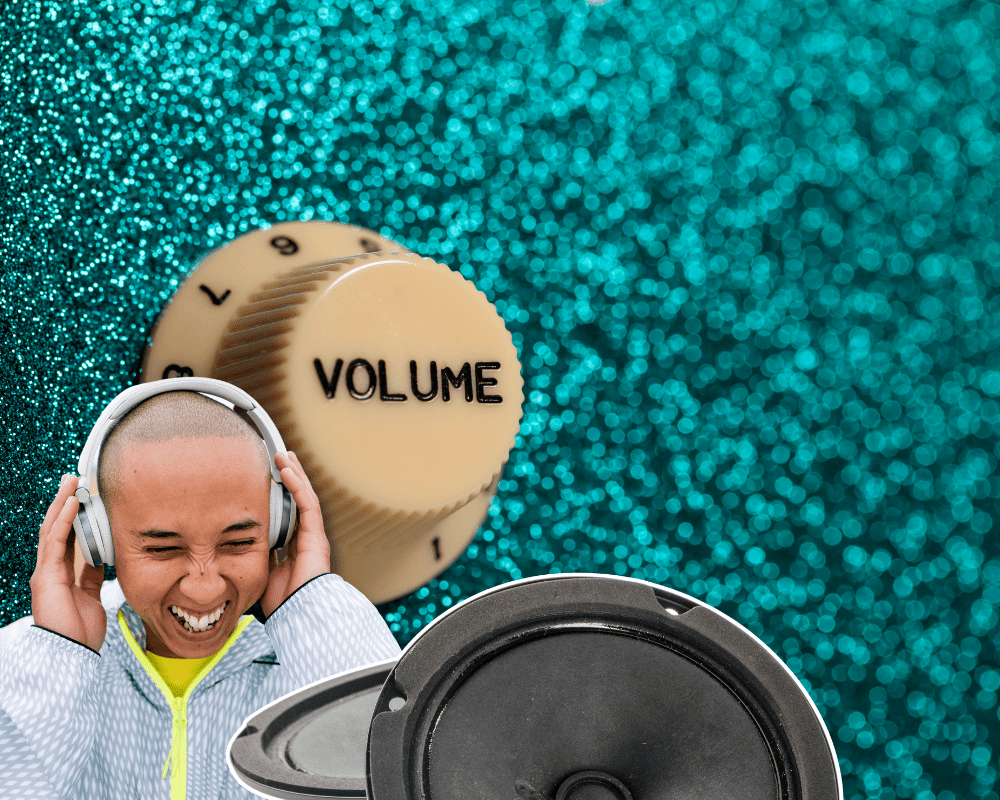
When you finally get to use your new headphones, there are a couple of things you should be on the lookout for.
First, how’s the volume? Are you able to get the advanced control you need? Can you hear faint noises that you couldn’t before? If not, keep looking.
The second is sound clarity. This is different from volume in that it’s the quality of the noise, not how loud it is.
You want to be able to hear each and every beep distinctly without any static or other noises getting in the way.

If you can’t tell one noise from another, it’ll be more difficult to find what you’re looking for.
The next thing to consider is how well the headphones cancel out external noise. If you live in a noisy area, this is an important factor.
You want to be able to focus on the sounds coming from your headphones and not what’s happening around you.
There are a couple of ways to test this. The first is to simply wear them in a noisy area and see how well they work.
The second is to put on some music or other noise and see if you can still hear it with the headphones on.

If you can, then they aren’t doing a very good job of canceling out noise.
Last but not least, how’s the battery life?
If you’re using wireless headphones, the sound could suffer when the power is drained.
Just something to keep in mind.
FAQs About Metal Detector Headphones
I’d be surprised if you didn’t have more questions.
You’ve looked at your options. You know what to consider.
But there’s always more to learn and get an opinion on.
So, all you curious Diggers and novice detectorists, let’s dive in!
Why Do Metal Detectors Have Headphones?
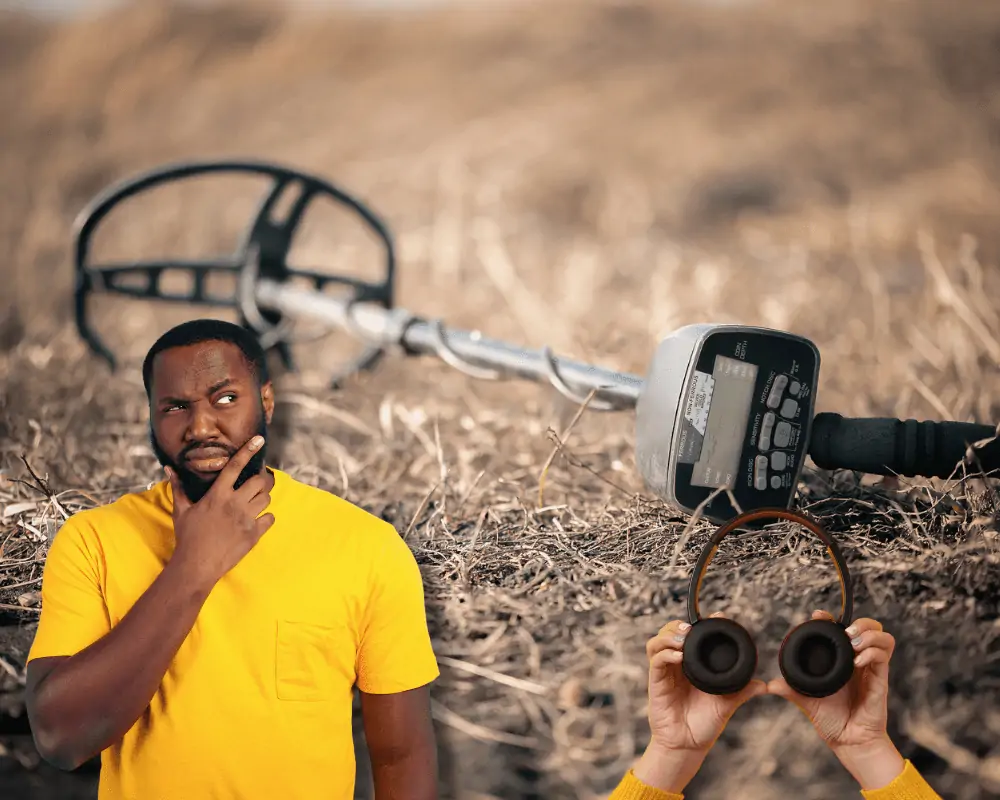
This is a great question with a pretty simple answer.
The main reason people use headphones with their metal detectors is for sound quality.
Headphones provide a clear and concise way to hear the detector without outside interference.
That bump in quality sound lets you hear tones you might have missed, and differentiate the metals in the soil.
Sound quality is the clear-cut #1 answer but it’s not the only reason.
You should also consider the people around you.

If you’re new to metal detecting, let me fill you in before you find out too late.
It’s just good etiquette to use headphones when metal detecting in public.
I don’t mean when you’re hunting in a popular field on someone else’s farm.
I’m talking about when you’re in a park, on the beach, or any other area where people are enjoying their day.
The last thing anyone wants is for your beeps to ruin their perfect moment of silence. It’s just rude.
So please, for everyone’s sake, use headphones when you can.

Finally, using headphones when metal detecting gives you a ton of other benefits. You get to focus and learn the different audio tones. You won’t need to worry about missing targets if you’re hard of hearing.
And using headphones will actually extend the life of the battery on your metal detector.
Can You Use a Metal Detector Without Headphones?
Yes, you can use a metal detector without headphones, but the quality will be worse than hunting with headphones.

As I mentioned before, the main reason people use headphones is for sound quality.
If you don’t have headphones, you’re stuck using the built-in speaker on your metal detector.
The sound coming out of those tiny speakers is never going to be as good as what you get with headphones.
It’ll be more difficult to hear faint signals and differentiate between different types of metals.
So, if you’re serious about metal detecting, I would recommend using headphones.
Can You Use Any Headphones for Metal Detecting?
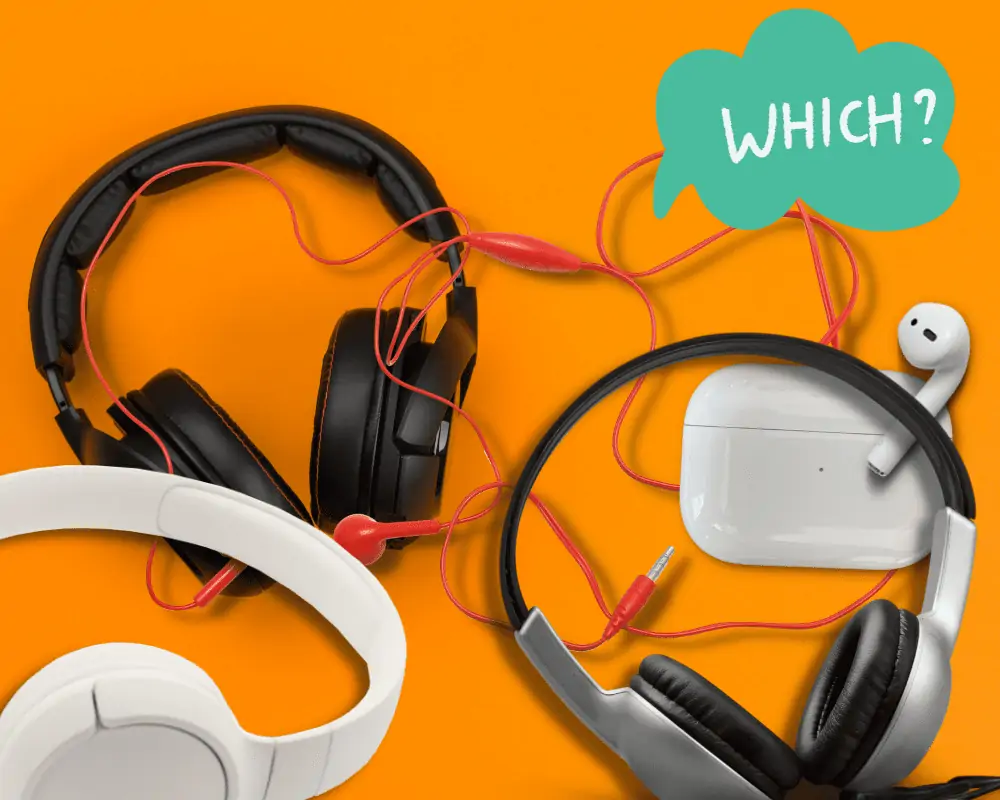
You can use any set of headphones for metal detecting as long as you have the appropriate connection available.
If your headphones aren’t Bluetooth or use a 1/4″ or 1/8″ audio jack, you’ll have to purchase an adapter to transmit a signal.
Now, the better question you need to ask is, Should you use any headphones for metal detecting?
No, you shouldn’t.

Not every pair of headphones will give you the needed ability to block out external noise or control the volume.
Before buying any old pair of headphones, determine what it is you need out of them to get peak performance.
Then do your research so you pick a trusted brand with a history of performance.
What Are the Best Headphones for Gold Detecting?

You don’t want to miss out on any gold nuggets below the surface, do you?
You’ve got the right metal detector for any sized gold waiting to be discovered. But what about headphones?
The best headphones for gold detecting are the Detectorpro Black Widow headphones.
The Black Widow design sound quality is next level. And that’s what you’ll need to guarantee results.
For the most successful hunt for gold, your headphones should have a dual rotary volume control, keep out all ambient noise, and come with a selector switch to be compatible with other metal detectors.

I’ll give you one guess on which gold-detecting headphones fit the bill.
That’s right!
The Black Widow headphones have all that and then some.
An impedance of 150 ohms, soft and comfy full-ear surround muffs, and speakers built professionally to pick up all the hard-to-hear tones.
Good luck passing on these bad boys!
Hear Me Out

Well, that’s all folks!
Thanks for sticking it out with me. You are now as up-to-date and knowledgeable on metal detecting headphones as I am.
Remember, you can’t go wrong with the Gray Ghost Ultimate as your pro set of metal detecting headphones. But if wireless is your preference, Garrett’s MS-3 has no equal.
But hey, if you aren’t too sure, go back and talk yourself through the 5 pillars for choosing the best metal detector headphones.
I hope you enjoyed this post and please feel free to share it with anyone who might need a little help in the headphone department.
Until next time Diggers!





